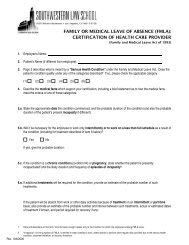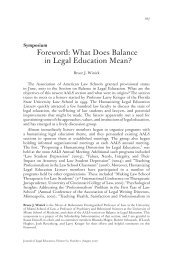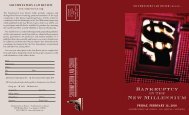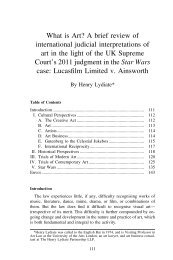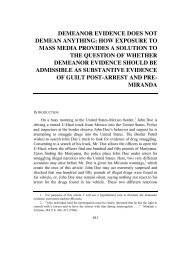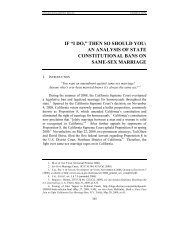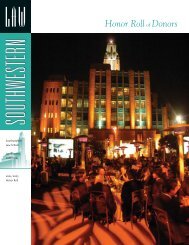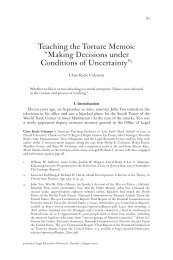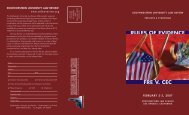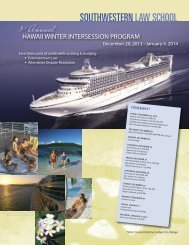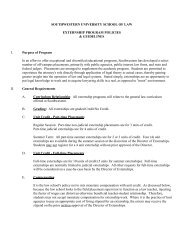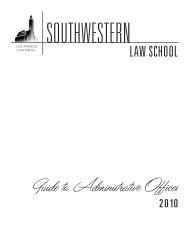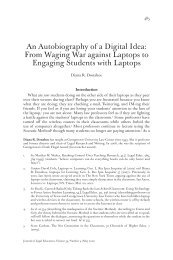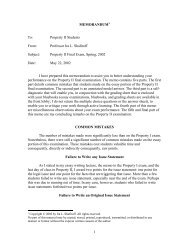Censoring the Censors in the WTO - Southwestern Law School
Censoring the Censors in the WTO - Southwestern Law School
Censoring the Censors in the WTO - Southwestern Law School
You also want an ePaper? Increase the reach of your titles
YUMPU automatically turns print PDFs into web optimized ePapers that Google loves.
56 J. Int’l Media & Enterta<strong>in</strong>ment <strong>Law</strong> Vol. 3, No. 1<br />
been considered by nations all around <strong>the</strong> world to implicate moral and<br />
public order concerns, 244 and <strong>the</strong>n it reviewed <strong>the</strong> specific U.S. state<br />
and federal laws that Antigua was challeng<strong>in</strong>g to determ<strong>in</strong>e if <strong>the</strong> U.S.<br />
Congress, <strong>in</strong> particular, had enacted <strong>the</strong>se laws <strong>in</strong> order to protect “public<br />
morals” and/or “public order.” After review<strong>in</strong>g a number of laws<br />
at length, <strong>the</strong> panel ultimately determ<strong>in</strong>ed that <strong>the</strong> U.S. Congress had<br />
<strong>in</strong>tended for three of <strong>the</strong> federal statutes that Antigua was challeng<strong>in</strong>g—<br />
<strong>the</strong> Wire Act, 245 <strong>the</strong> Travel Act,<br />
246<br />
and <strong>the</strong> Illegal Gambl<strong>in</strong>g Bus<strong>in</strong>ess<br />
Act, 247 read toge<strong>the</strong>r with certa<strong>in</strong> state laws—to “address concerns perta<strong>in</strong><strong>in</strong>g<br />
to money launder<strong>in</strong>g, organized crime, fraud, underage gambl<strong>in</strong>g<br />
and pathological gambl<strong>in</strong>g.” 248 As all of <strong>the</strong>se situations <strong>in</strong>volved<br />
violations of standards of right conduct, <strong>the</strong> panel concluded that <strong>the</strong>se<br />
laws met <strong>the</strong> def<strong>in</strong>ition of “measures to protect ‘public morals or public<br />
order.’ ” 249<br />
F<strong>in</strong>ally, however, <strong>the</strong> panel ruled that <strong>the</strong> U.S. had failed to provisionally<br />
justify that any of <strong>the</strong>se laws were “necessary to protect public morals<br />
and/or public order with<strong>in</strong> <strong>the</strong> mean<strong>in</strong>g of Article XIV (a).” 250 This<br />
was <strong>the</strong> case, accord<strong>in</strong>g to <strong>the</strong> panel, because “<strong>the</strong> U.S. ha[d] decl<strong>in</strong>ed<br />
Antigua’s <strong>in</strong>vitation to engage <strong>in</strong> bilateral and/or multilateral consultations<br />
and/or negotiations to determ<strong>in</strong>e whe<strong>the</strong>r <strong>the</strong>re . . . [was] a way of<br />
address<strong>in</strong>g its concerns <strong>in</strong> a <strong>WTO</strong>-consistent manner.” 251 In addition, <strong>the</strong><br />
panel ruled that, given that <strong>the</strong> federal Interstate Horserac<strong>in</strong>g Act (IHA)<br />
permitted domestic companies to provide on-l<strong>in</strong>e gambl<strong>in</strong>g services <strong>in</strong><br />
connection with horse races, <strong>the</strong> U.S. had not met its burden of prov<strong>in</strong>g<br />
that its refusal to permit Antigua to provide such services did not “constitute<br />
‘arbitrary or unjustifiable discrim<strong>in</strong>ation . . . and/or a ‘disguised<br />
restriction on trade’ <strong>in</strong> accordance with <strong>the</strong> requirements of <strong>the</strong> chapeau<br />
of Article XIV.” 252 In light of all of <strong>the</strong> above, <strong>the</strong> panel ordered <strong>the</strong> U.S.<br />
to br<strong>in</strong>g its laws <strong>in</strong>to compliance with its GATS commitments. 253<br />
The Appellate Body <strong>in</strong> this case affirmed parts of <strong>the</strong> panel’s decision<br />
and reversed o<strong>the</strong>r parts. Specifically, it reversed <strong>the</strong> panel’s<br />
conclusion that various U.S. state laws constituted a violation of <strong>the</strong><br />
244. Id. at 6.471-6.473.<br />
245. 18 U.S.C. § 1084.<br />
246. Id. § 1952.<br />
247. Id. § 1955.<br />
248. Id. at 6.486.<br />
249. Id. at 6.481.<br />
250. Id. at 6.535.<br />
251. Id. at 6.533.<br />
252. Id. at 6.607.<br />
253. Id. at 7.5.<br />
3058-088-3pass-02_Wright-r03.<strong>in</strong>dd 56<br />
6/30/2010 12:02:00 PM



